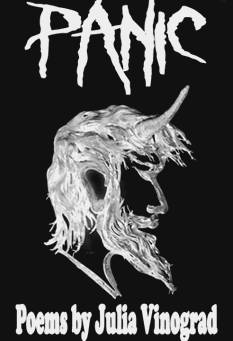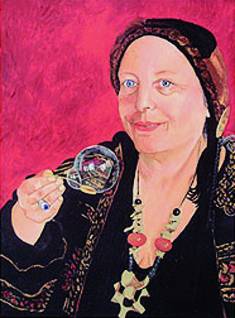
Review by Mary Meriam
What of all the worlds we never know and never get to see? Some poets helpfully capture worlds in their books, worlds packed with energy, visions, thoughts, and feelings about particular places and people. Julia Vinograd has an uncommonly vivid, alert, and original perspective on the world she inhabits.
Vinograd is a well-educated writer (with a B.A. from the University of California at Berkeley and an M.F.A from the University of Iowa) and a beloved, celebrated poet with awards and accolades. Julia Vinograd is also a Berkeley street poet, and Panic is her 55th book. These two facts require some thought: What is a street poet? Who has written 55 books of poems? Vinograd has had a unique and remarkable writing life.
She sells her books on the streets, and when she isn’t selling her books, she writes poems about street people and places. Vinograd’s books illuminate this tight-knit creative ecology. She tells us, in these two sections from “Writing a Poem,” that her world, far from being limited, is cosmic, painful, demanding, exotic, and rich:
Snakes sing in twisted old trees.
I lean on a cane to keep speeding stars
from crashing into my head.
I skin my knees on the moon.
Other people’s blood quacks for my attention
like ducks for breadcrumbs.
I remember digging a hole to China in my back yard,
the smell of moist earth and snails.
I’m still digging down to the paper,
breathing hard.
In contrast to the passionate, urgent searching of the above last two lines, Vinograd concludes the following carefully observed ekphrastic poem by subtly excoriating God for spacing out over a rose, oblivious to the Holocaust:
For the Holocaust Paintings of Samuel Bak
by Julia Vinograd
The color of memory, the color of time.
A refugee ship sails out between cracks of sun-baked clay.
The sea is made of bricks.
Bearded wanderers bent over,
carrying the Tree of Life like a suitcase
kicking stones to make a path beneath their feet.
A young boy with a cap
peering thru the holes in history
sees equally armies and a toad croaking marvelously.
Both birds and angels wear raw wooden
roughly hinged wings;
the sky tears to let them thru, the sky tears anyway.
Wings of splintered boards from the town dump,
the town burned behind them.
Everything burned.
Eyes get in your smoke.
What a rose must look like to God
when He wasn’t looking at anything else
and He should’ve been.
In a poem about the Holocaust, Vinograd’s world of Berkeley street people is echoed in the “Bearded wanderers bent over,” refugees, armies, burned towns, and even homeless birds and angels, with their makeshift wings, doing the best they can, while the sky tears to make room for them, the sky already torn, and “Everything burned” like a perverse biblical sacrifice.

As she has many times before, Vinograd draws portraits of soldiers. In these lines from “Soldiers,” she brilliantly reverses her frequent use of personification, so that the soldiers become the war itself:
We were no longer human but fireworks;
using our names for fuel our skins exploded
in bursts of brightness above the jungle
while everyone burned, screamed and ran.
We were a gut roar of triumph
sinking a bloody knife into morning.
For a moment we were bigger than tomorrow.
Then we woke up in hospitals,
still alive,
and knew we had failed.
Vinograd’s deep-rooted compassion for life makes her portrayals of suffering, death, and destruction overwhelmingly poignant. Each powerful line is another indictment of the insanity perpetrated in the world. Some of Vinograd’s most beautiful poems personify Jerusalem. In “Jerusalem’s Night,” the woman, Jerusalem, with the cosmos in her hair, wants to be a wild horse — not a place, not a person, not blessed, not adored, not holy — simply free:
Jerusalem went into night
to hide from the stars in her hair.
“Oh, let me be a wild horse
never lassoed by blessings,
never ridden by love, let everything holy
be only holes in the ground
for my young hoofs to leap over…”
You can find Julia Vinograd on Telegraph or at Fourth Street in Berkeley, hawking Panic for $5.
Pan In The Tenderloin
by Julia Vinograd
The drunks who saw a goat-legged man
thought he was just the Devil,
and what kind of liquor do they drink in hell
and does he have an extra bottle handy?
Then Pan lifted his pipes and blew antique sorrow,
tall old forests where the sun never shines.
Drunks looked around for their highway underpass,
trucks charging overhead. Ambulances screeching.
So silent around Pan’s music even the cops
would’ve been welcome. Ruthless music.
Pan gave the drunks one glance under his shaggy
curls, then the pipes shoved them on their sodden
staggering feet into a stumbling dance.
“Hey no,” the drunks gasp while he prodded their
livers back to life.
Some of the working girls left their corners,
kicked off their heels and danced barefoot for Pan.
Tomorrow their pimps will beat them
for all the money they didn’t make.
But tomorrow’s far away.
The scent of pine needles underfoot
drowns their cheap perfume.
Spiderwebs cover their false eyelashes.
Pan doesn’t touch the girls except with his music
leaving virgin bruises. Then he’s gone.
The drunks tell all about how they met the Devil
and tourists give them money to go away.
